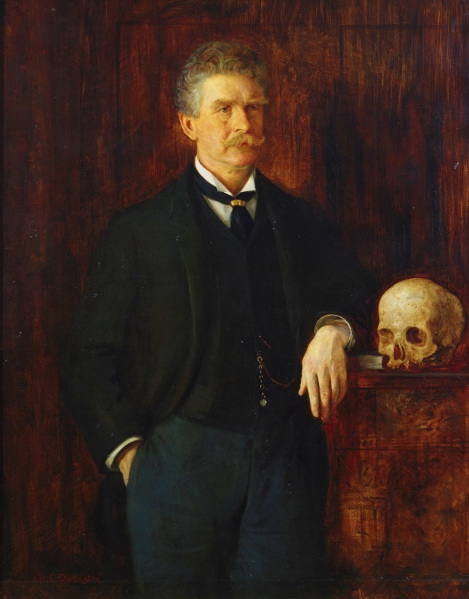
Over a recent weekend I was reading Paul Fatout’s Ambrose Bierce: The Devil’s Lexicographer (1951), a rather dated but still readable biography of the American journalist remembered for his macabre short stories and the compilation of satirical definitions acknowledged in Fatout’s subtitle: The Devil’s Dictionary (1911, originally published under the far inferior title The Cynic’s Word Book [1906]). I was familiar with the broad outlines of Bierce’s life—growing up in the Midwest; serving in the Union Army during the Civil War; moving to San Francisco and taking up journalism, punctuated by a stint in England; engaging in all sorts of literary feuds; compiling a much-too-long and indiscriminate edition of his collected works; and disappearing under mysterious circumstances in Mexico during the Mexican Revolution—already.
But there was plenty in Fatout’s book new to me, including the fact that Bierce is a cousin of mine. (A distant cousin: our most recent common ancestors are William Bradford, the son of the governor of Plymouth Colony, and his wife Alice Richards Bradford. It is perhaps apropos to note that The Devil’s Dictionary defines genealogy as “An account of one’s descent from an ancestor who did not particularly care to trace his own.”) But thinking about genealogical matters prompted me to wonder: what did Bierce, who reached manhood just around the time that the Origin was published, think about Darwin? What did the devil’s lexicographer think of the devil’s chaplain? (Darwin, in a 1856 letter to Hooker, exclaimed, “What a book a Devil’s chaplain might write on the clumsy, wasteful, blundering low & horridly cruel works of nature!”)
Darwin is not mentioned in the index of Fatout’s book, so, not having any further biographies of Bierce at hand, I returned to Thomas F. Glick’s What about Darwin? (2010), which, in the words of its Victorian subtitle, presents “all species of opinion from scientists, sages, friends, and enemies who met, read, and discussed the naturalist who changed the world.” Reviewing it for Reports of the NCSE, I described it as “simply a delightful book to browse through” in part because there are so many unlikely people to be found in it offering their views on Darwin. But, alas, no Bierce was to be found, despite the fact that he announced early in his career that his program was “calm disapproval of human institutions in general … ; enthusiastic belief in the Darwinian theory, intolerance of intolerance, and war upon every man with a mission…”
So I suppose it’s up to me! Bierce was not a systematic or consistent thinker, and he never seems to have attempted to discuss Darwin seriously at any length. There is genuine respect offered for Darwin, to be sure. In discussing the importance of style in literature, for example, Bierce writes, “What could be more important and striking than the matter of Darwin’s books, or Spencer’s?” (He immediately adds, by way of contrast, “Does anyone think of Darwin and Spencer as men of letters?” and the answer is evidently supposed to be no, although scholars like Stanley Edgar Hyman, Gillian Beer, and George Levine have argued that the Origin is indeed a contribution to literature. Spencer here is presumably Herbert Spencer [1820–1903], the evolutionary philosopher who coined the phrase “survival of the fittest”; nobody now praises his style.)
Similarly, in discussing the discovery of the electron, Bierce begins, “It is of course to be expected that the advance of scientific knowledge will destroy, here and there, a cherished illusion. It was so when Darwin showed us that we are not made of mud, but have ‘just growed.’” (The allusion is to Topsy, in Uncle Tom’s Cabin [1852], who, catechized, “Do you know who made you?” answered, “Nobody, as I knows on. … I ’spect I grow’d.”) “At least that is what Darwin is by many held to have done, and deep is their resentment. In a general way it may be said that the path of scientific progress is strewn with the mouldering bones of our dearest creations.” But by far the majority of the explicit references to Darwin I found in Bierce’s work are facetious and offered for effect—which is not to say that they’re not amusing! I will give a few examples in part 2.

